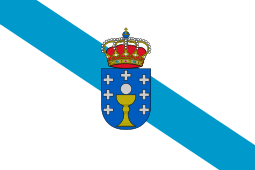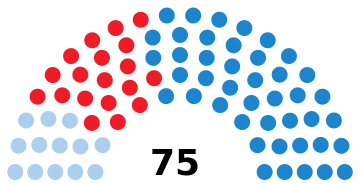Galician parliamentary election, 1993

|
|
|
|
All 75 seats in the Parliament of Galicia
38 seats needed for a majority |
| Opinion polls |
| Registered |
2,293,169  2.1% 2.1% |
| Turnout |
1,472,017 (64.2%)
 4.7 pp 4.7 pp |
| |
First party |
Second party |
Third party |
| |
.jpg) |
.jpg) |
.jpg) |
| Leader |
Manuel Fraga |
Antolín Sánchez |
Xosé Manuel Beiras |
| Party |
PPdeG |
PSdeG–PSOE |
BNG |
| Leader since |
1989 |
10 February 1991 |
1982 |
| Leader's seat |
Lugo |
A Coruña |
A Coruña |
| Last election |
38 seats, 44.0% |
28 seats, 32.7% |
5 seats, 8.0% |
| Seats won |
43 |
19 |
13 |
| Seat change |
 5 5 |
 9 9 |
 8 8 |
| Popular vote |
763,839 |
346,831 |
269,233 |
| Percentage |
52.1% |
23.7% |
18.4% |
| Swing |
 8.1 pp 8.1 pp |
 9.0 pp 9.0 pp |
 10.4 pp 10.4 pp |
|
|
|
The 1993 Galician parliamentary election was held on Sunday, 17 October 1993, to elect the 4th Parliament of Galicia, the regional legislature of the Spanish autonomous community of Galicia. All 75 seats in the Parliament were up for election.
The People's Party (PP) won with an increased absolute majority over 1989, resulting in Manuel Fraga being re-elected for a second term in office as President of Galicia. The Socialists' Party of Galicia (PSdeG-PSOE) suffered from a crisis of leadership and from a desire of punishment to the national government of Felipe González, losing many votes in the way. Meanwhile, the Galician Nationalist Bloc (BNG) began to appear as the main alternative to power thanks to the its spokesman's, Xosé Manuel Beiras, charisma.
The Galician Unity coalition of United Left (EU) and the Galician Socialist Party-Galician Left (PSG-EG) did not enter Parliament due to a change of the electoral law in 1991, which raised the electoral threshold from 3% to 5%. Galician Coalition (CG) also failed to enter Parliament, and only got 0.4% of the share.
Electoral system
The 75 members of the Parliament of Galicia were elected in 4 multi-member districts, corresponding to Galicia's four provinces, using the D'Hondt method and a closed-list proportional representation. Each district was entitled to an initial minimum of 10 seats, with the remaining 35 seats being allocated among the four provinces in proportion to their populations. For the 1993 election, seats were distributed as follows: Corunna (24), Lugo (15), Ourense (15) and Pontevedra (21).
Voting was on the basis of universal suffrage in a secret ballot. Only lists polling above 5% of the total vote in each district (which includes blank ballots—for none of the above) were entitled to enter the seat distribution.[1]
Opinion polls
Vote
Poll results are listed in the table below in reverse chronological order, showing the most recent first. The highest percentage figure in each polling survey is displayed in bold, and the background shaded in the leading party's colour. In the instance that there is a tie, then no figure is shaded. The lead column on the right shows the percentage-point difference between the two parties with the highest figures. Poll results use the date the survey's fieldwork was done, as opposed to the date of publication. However, if such date is unknown, the date of publication will be given instead.
Seat projections
Opinion polls showing seat projections are displayed in the table below. The highest seat figures in each polling survey have their background shaded in the leading party's colour. In the instance that there is a tie, then no figure is shaded. 38 seats were required for an absolute majority in the Parliament of Galicia.
Results
Overall
|
Blank ballots |
13,355 | 0.91 | +0.51 |
|
| |
| Total |
1,464,910 | 100.00 | |
75 | ±0 |
| |
| Valid votes |
1,464,910 | 99.52 | +0.34 |
|
| Invalid votes |
7,107 | 0.48 | –0.34 |
| Votes cast / turnout |
1,472,017 | 64.19 | +4.69 |
| Abstentions |
821,152 | 35.81 | –4.69 |
| Registered voters |
2,293,169 | |
| |
| Source: Argos Information Portal |
Notes
References

.jpg)
.jpg)
.jpg)